ANALYSIS Pastor and researcher Ryan Burge gives a detailed report on whether the word “evangelical” is still a word US Christians still want to use.
(ANALYSIS) I think it may be the most toxic word in American religion — evangelical. It’s almost used as an epithet now. I am fascinated by that, by the way, because I grew up evangelical — literally as evangelical as you can get in a nearly 100% White Southern Baptist Church in a small town in Southern Illinois in the 1990s. That’s the epitome of evangelical.
Yet, I cannot, for the life of me, remember a single instance when that word was mentioned from the pulpit or in the pews or the hallways of that church. In fact, I didn’t really become aware of it until I went to college. Then, it was actually a big topic of debate at Greenville (which is aligned with the Free Methodist Church). Some folks thought we should lean into the label — others thought it wasn’t a good idea.
I didn’t care either way because I didn’t really know what the term meant. Funny to look back on my total ignorance of the word “evangelical” then, as I now have actually debated other folks on what the word means.
Here’s the purpose of this post: figuring out just how many Americans have shed that label in the last several years. The CES asks every single respondent, do you consider yourself a born-again or evangelical Christian or not? Only two response options — yes and no. It’s about as simple and straightforward as you can get. So, let’s get to it.

In 2008, a full third of the sample self-identified as evangelical. But in the next five years or so, there was a clear decline. By 2013, that share had likely dropped below 30%. In the last three years of the survey, the share of American adults who self-identify with the evangelical label is consistently around 27%.
That’s a full six-point decline in the evangelical label. For perspective, Jews, Latter-day Saints, Hindus, Buddhists and Muslims together are probably right about 6% of the population. Six per cent is a lot.
But, obviously, that decline is not happening evenly across every demographic group in the United States. Some are probably walking away from the label faster than others, right? Let’s find out. I am starting with age now. These are five-year birth cohorts, which is my preferred way of gauging the impact of age on some other variable.
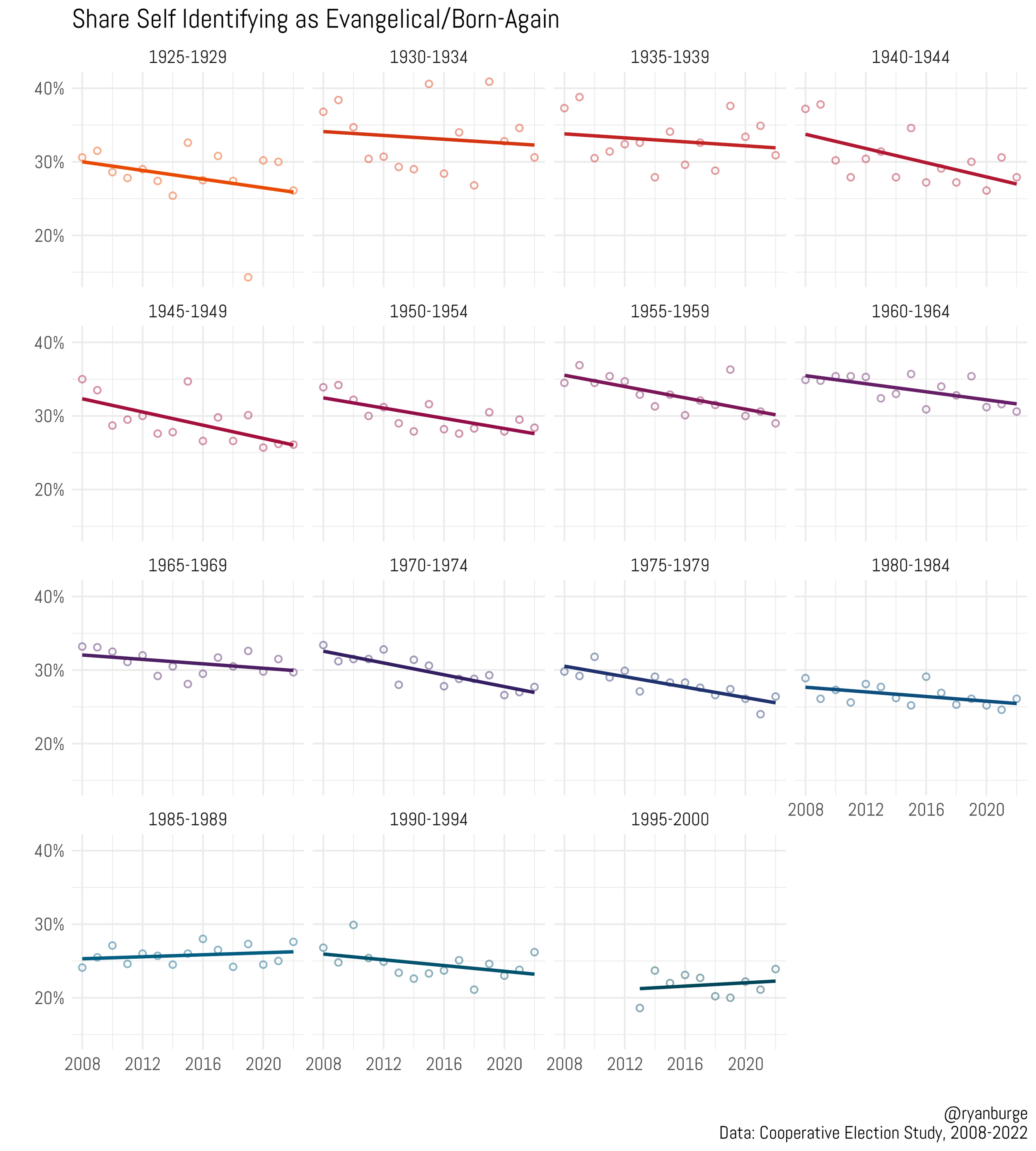
That’s a lot of lines that are pointing in the downward direction. And what is really striking to me is that it’s happening across all kinds of birth cohorts, young and old. Now, it’s clear that the pitch of those lines is not all the same. For instance, those lines in the second row (1945-1964) are particularly steep. That means that the term evangelical has become especially unattractive to folks who either retired or are getting very close to it.
It’s noteworthy that the last two rows of birth cohorts don’t show a decline that is nearly that aggressive. For instance, the 1980s cohorts are pretty uneventful compared to the older generations. In fact, among those born in the late 1980s, the share who self-identify as evangelical has actually risen very slightly since 2008. Also, check out the youngest cohort — those born between 1995 and 2000. That line is pretty much flat, too.
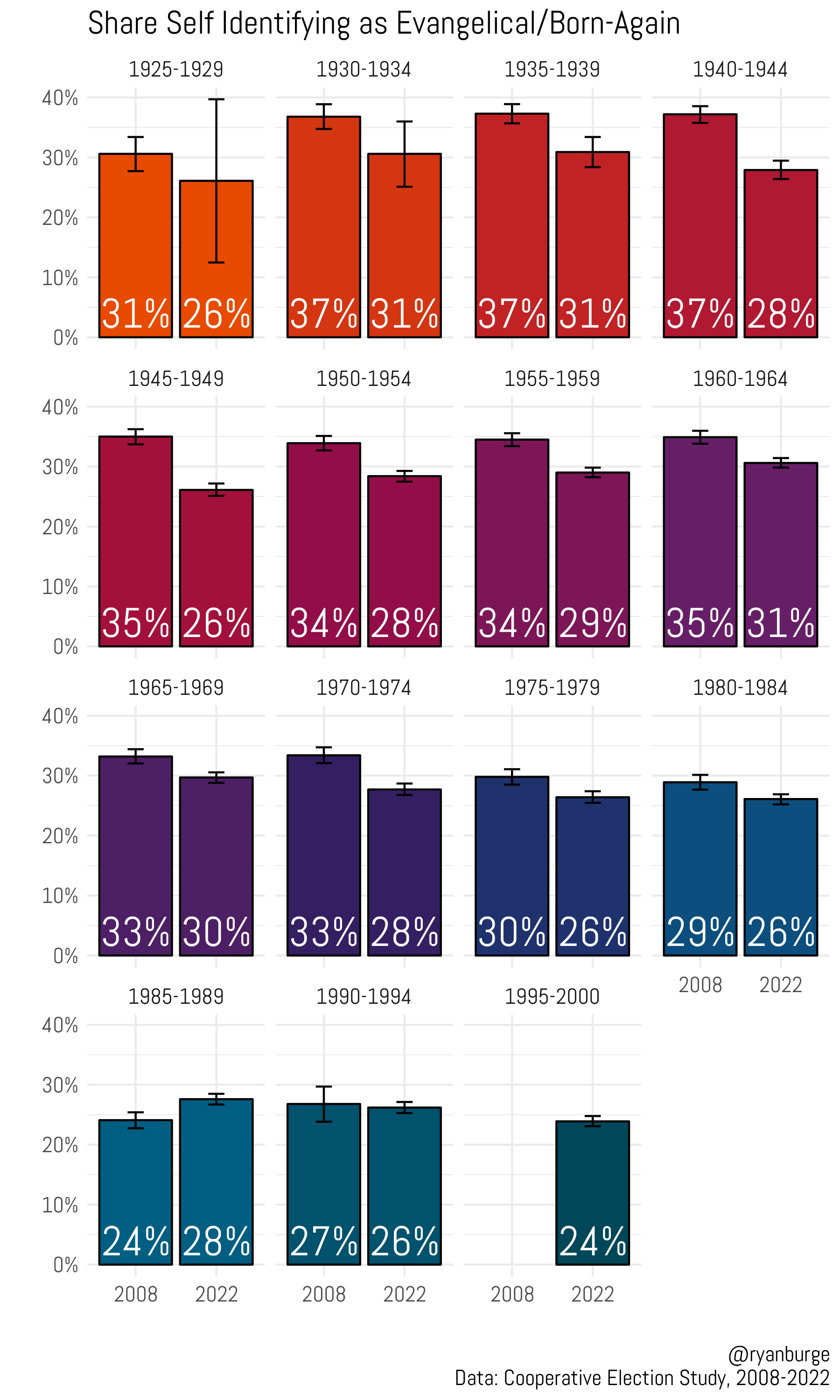
I wanted to simplify that last graph by just comparing the evangelical share in 2008 with that same share in 2022. Again, this is broken into birth cohorts, and the capped lines represent 84% confidence intervals to give us a sense of when the differences are statistically significant.
Look at those born in the 1940s — that really jumps off the page. The share who identify as evangelical has dropped by nearly ten percentage points between 2008 and 2022. I just can say unequivocally that those are the biggest drops in this entire graph. That’s pretty shocking to me.
If you look at younger cohorts, there is a decline, but I think it’s accurate to call that a pretty modest dip. For instance, it’s just three points among those born in the late 1960s. It’s the same drop among those born in the early 1980s. But look at that bottom row. The late 1980s cohort has seen an increase in evangelicals (from 24% to 28%) and the late 1990s cohort is unchanged. So, the drop among evangelicals in the entire sample is likely being driven by older Americans, not younger ones.
But, of course, the elephant in the room in any discussion about evangelicals comes down to politics. There’s no doubt that the word evangelical has a significant political component to it now compared to 20 years ago. So, let’s try that out. These are birth cohorts that are further broken down into Democrats, independents and Republicans.

OK, let’s get this out of the way. Republicans are more likely to self-identify as evangelical compared to independents or Democrats. I know that we are all shocked by this revelation. But the red lines are pretty instructive. Trace them across the top two rows — they are perfectly straight. That means that older Republicans are not shedding the evangelical label. The bottom two rows have a bit of mixed evidence, though. There are clear declines among Republicans born in the 1970s, but some other cohorts are pretty straight across.
How about the blue lines? Yeah, those are almost always pointing downward. Remember how the big dips in evangelical identity were concentrated among older Americans. Let’s get even more specific — it’s older Democrats who are walking away from the evangelical label. And they aren’t small declines, either.
For instance, look at the early 1940s cohort. About 25% of Democrats were evangelicals in 2008. That’s dropped in half now to just 13%. The next cohort over-reported a drop that was nearly 10 points, too. This is the norm, in fact, for older Democrats — a drop of 8-12 points in identifying as evangelical. That’s really significant and tells a pretty compelling story of how the politicization of the evangelical label has turned off a lot of baby boomers.
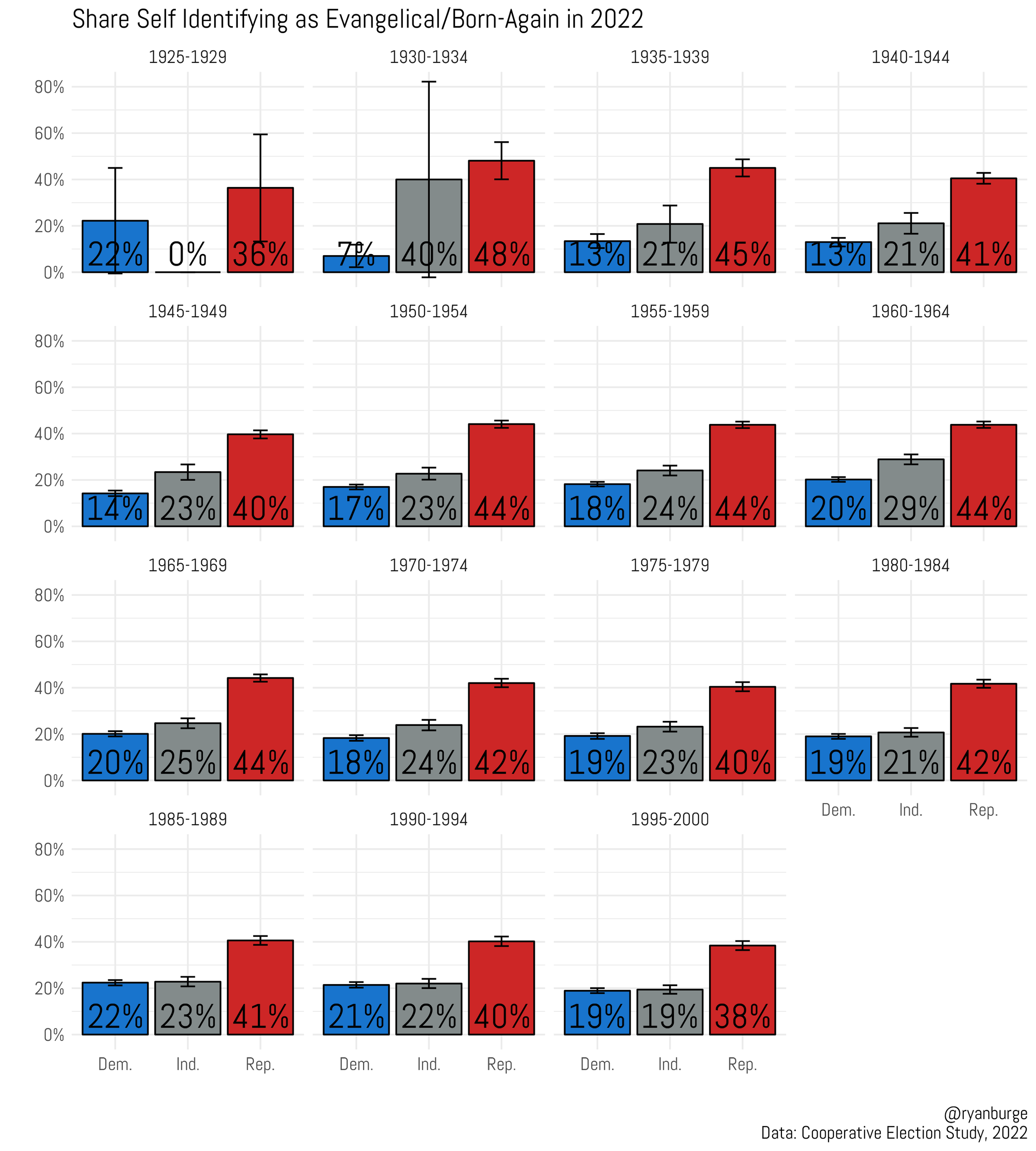
But I wanted to make it plain just how big the partisan divides are when it comes to the evangelical label by graphing the share who are evangelical in 2022 based on political identification for every cohort.
The 1945-1949 cohort just jumps out to me. A Republican in this age group is nearly three times more likely to identify as an evangelical compared to a Democrat (40% vs 14%). But the gap in the cohorts born in the 1950s is 27 points and 26 points, respectively. In fact, they’re the oldest cohorts where Democrats are the least likely to identify as evangelical, not the youngest one.
In the youngest cohorts, the gap actually narrows just a bit. For instance, among those born in 1985-1989, 22% of Democrats are evangelicals compared to 41% of Republicans. That same basic gulf is apparent in the two youngest cohorts, as well. But what could be driving this? I think one possible answer is a pretty simple one: race. Younger cohorts are way more racially diverse than older generations.
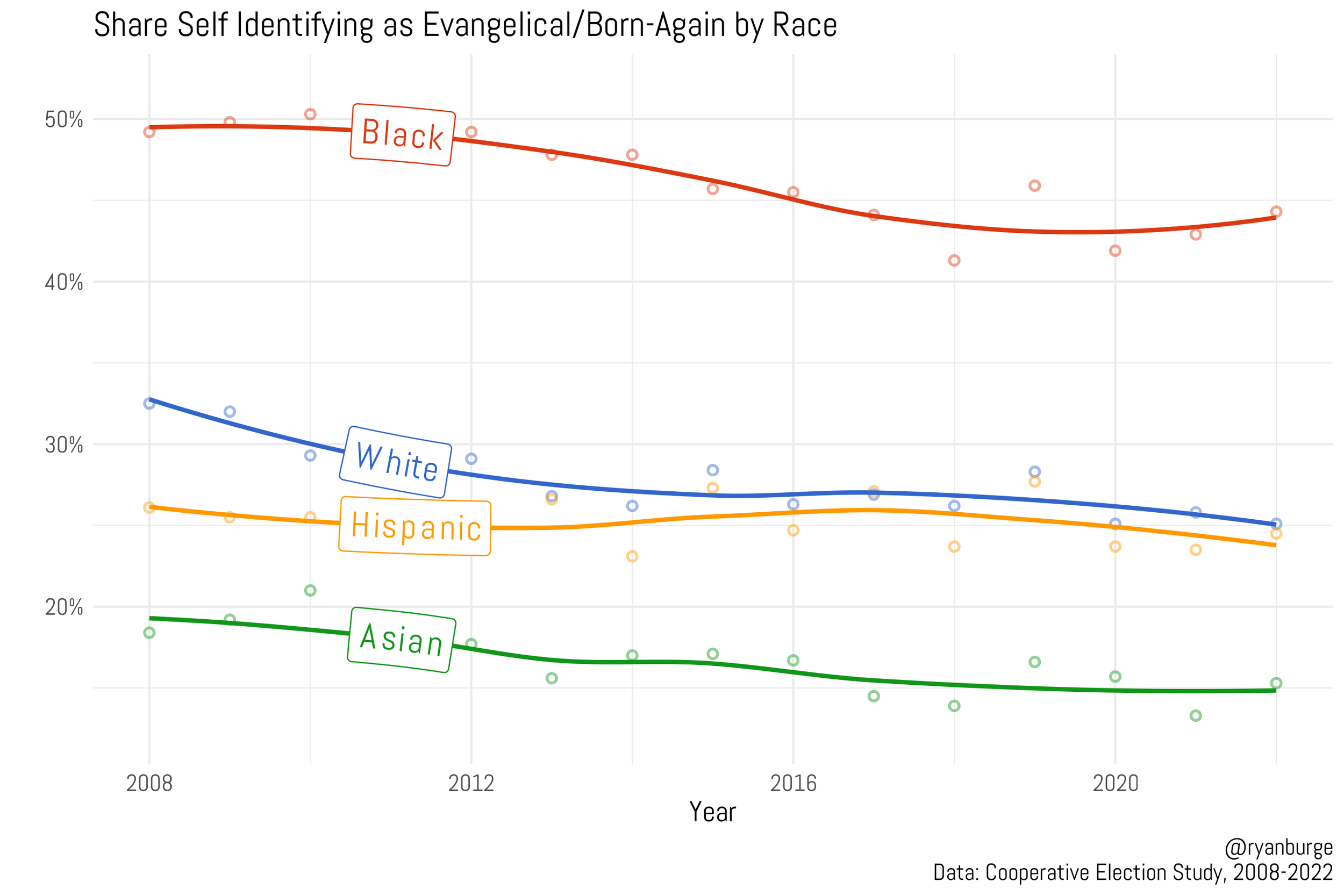
This may be the most myth-busting result from this entire analysis: the racial group that is the most likely to self-identify as evangelical/born-again is African Americans. And it’s not even close. In 2008, about half of Black respondents said that they were evangelicals. It’s dropped a bit to about 45% in 2022. But that share is still much higher than any other group.
When folks talk about evangelicals, it’s almost always implied that it’s White evangelicals. But in 2008, only a third of White respondents said that they were evangelical. It’s dropped to just 25% in the most recent sample. Think about that: 45% of Black folks are evangelicals, compared to only 25% of White respondents.
I think one of the biggest reasons that there isn’t more discourse about Black evangelicals is because that label just doesn’t seem to matter a whole lot when they go to the ballot box. This is vote choice in 2020 among racial groups divided into evangelical and non-evangelical categories.
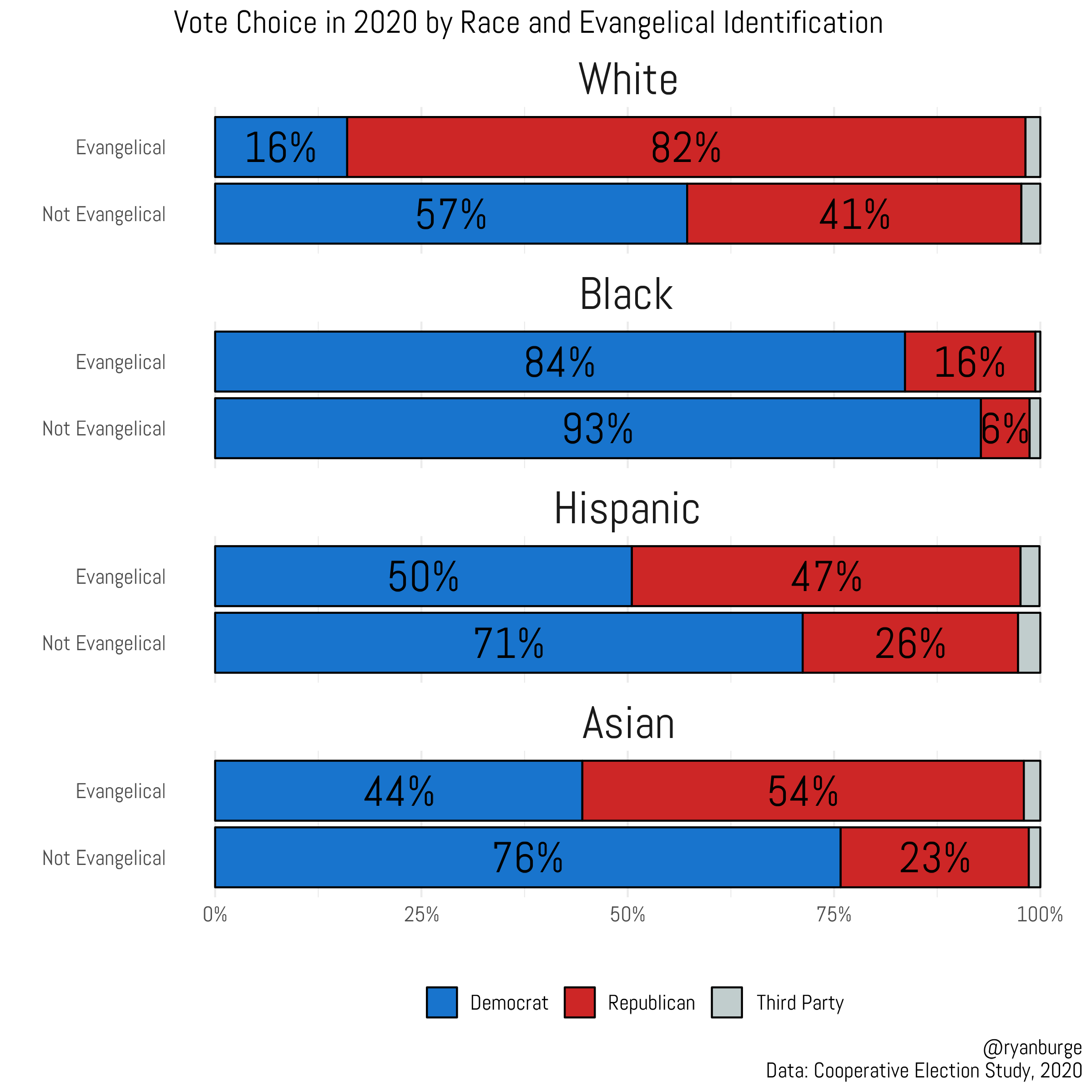
It should come as no big revelation that White evangelicals really liked Donald Trump. He got 82% of their votes. Among non-evangelical whites, Biden did much better at 57%, while Trump only got 41%. That’s a 41-point gap based on evangelical status.
For Black respondents, the difference in vote choice among evangelical and non-evangelical is fairly small. Trump only got 6% of Black respondents who did not identify as evangelical. He got 16% of the Black evangelical vote. Ten points is not nothing, but it’s most certainly not 41 points.
I do want to point out that the evangelical vote gap is large for Hispanics and especially Asians. Among Hispanic evangelicals, the vote was almost evenly split — 50% for Biden and 47% for Trump. For nonevangelical Hispanics, Biden dominated (71% vs 26%). For Asians, the gap was even larger. Trump got a majority of Asian evangelicals (54%). He only earned 23% of non-evangelical Asian voters.
I wanted to end this post with a regression analysis. It’s just the way that social science holds some variable constant while looking for the impact of other factors. I included all the usual suspects here: age, gender, race, income, education, Republican affiliation and weekly church attendance. I wanted to see which were the most predictive of someone self-identifying as evangelical.
It’s easy to interpret this graph. Anything to the right of zero means that the variable predicts a greater likelihood of being an evangelical. Anything to the left predicts a lower likelihood. However, if the estimate overlaps with zero, there’s no relationship between the two variables. I estimated this model for five different years of the CES to see if things have changed over time.
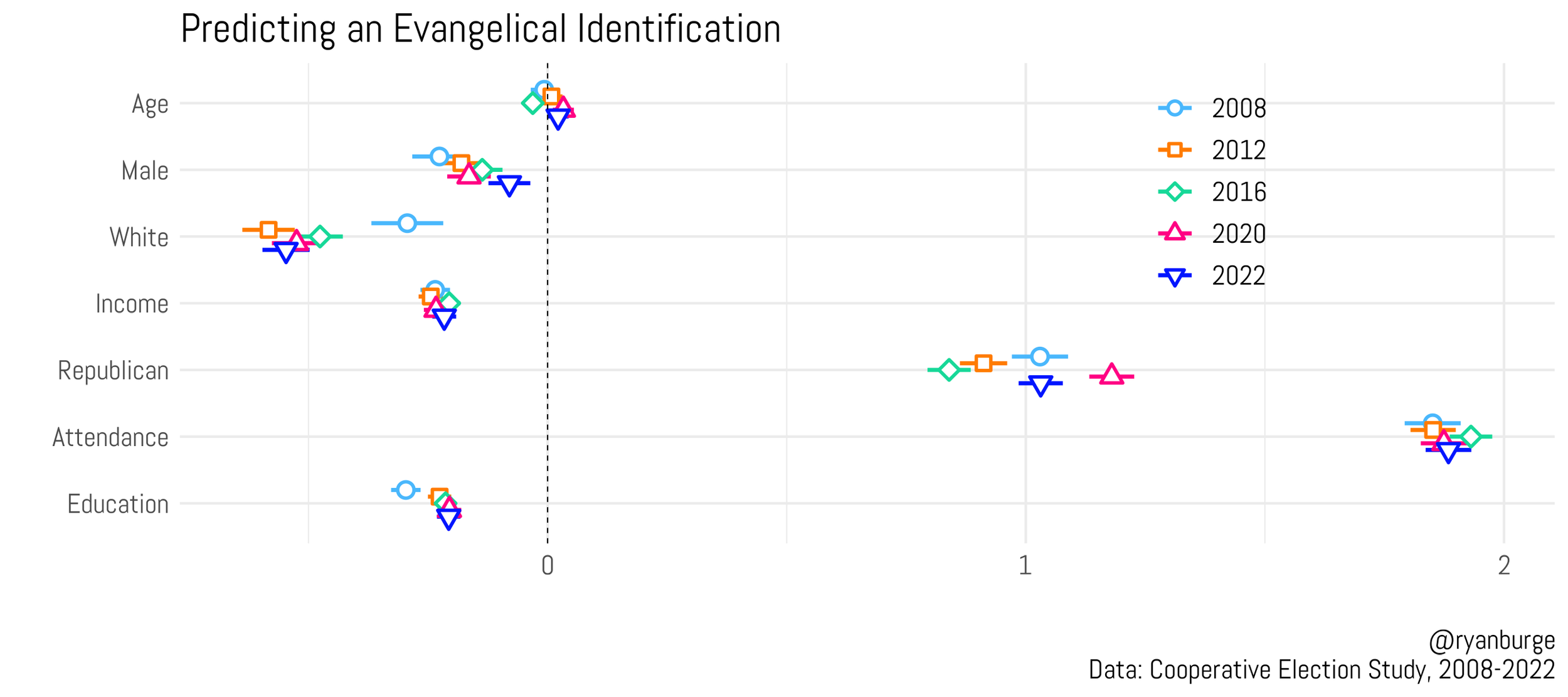
I can tell you this: There are a bunch of factors that make someone less likely to be an evangelical. Being male, being White, having higher household income, and higher education are all predictive of being less apt to identify as an evangelical. The age variable is clearly a mixed bag — not predictive either way.
There are two variables that make someone more likely to be an evangelical, and they should come as no surprise: weekly religious attendance and identifying as a Republican. Now, in this model, weekly attendance is by far the strongest predictor of self-identifying as evangelical. But it’s interesting to me that even when you throw in a religious variable, there’s still a strong positive relationship between aligning with the GOP and being an evangelical.
It’s not just religious activity that is driving people toward evangelicalism. That’s a clear empirical finding from these results. Evangelicalism has become an amalgam of both religious and political factors that are really hard to untangle.
I really like Ruth Braunstein’s thoughts on this subject in an article she wrote for the Guardian last year. It was entitled, “The backlash against rightwing evangelicals is reshaping American politics and faith.” Her thesis was simple, yet profound: Evangelicalism has essentially purified itself in the last several years. It’s made some people even more committed to the religious movement and its cause. It’s also pushed a lot of people out.
I always think of Moses and the parting of the Red Sea. He lowered his staff and the sea retreated to the right and to the left. Donald Trump has been the Red Sea movement for the evangelical movement. He’s forced people to pick a side in a way that previous presidents didn’t. I don’t think anyone would call George W. Bush the Great Divider.
Is a smaller, yet more faithful movement a laudable goal? That’s for other people to decide. But it does seem like that’s the choice that the evangelical movement has made in the last several years.
This post is republished from “Graphs About Religion” on Substack.
Ryan Burge is an assistant professor of political science at Eastern Illinois University, a pastor in the American Baptist Church and the co-founder and frequent contributor to Religion in Public, a forum for scholars of religion and politics to make their work accessible to a more general audience. His research focuses on the intersection of religiosity and political behaviour, especially in the U.S. Follow him on Twitter at @ryanburge.
Image Credit: Kenneth C. Zirkel /Wikimedia

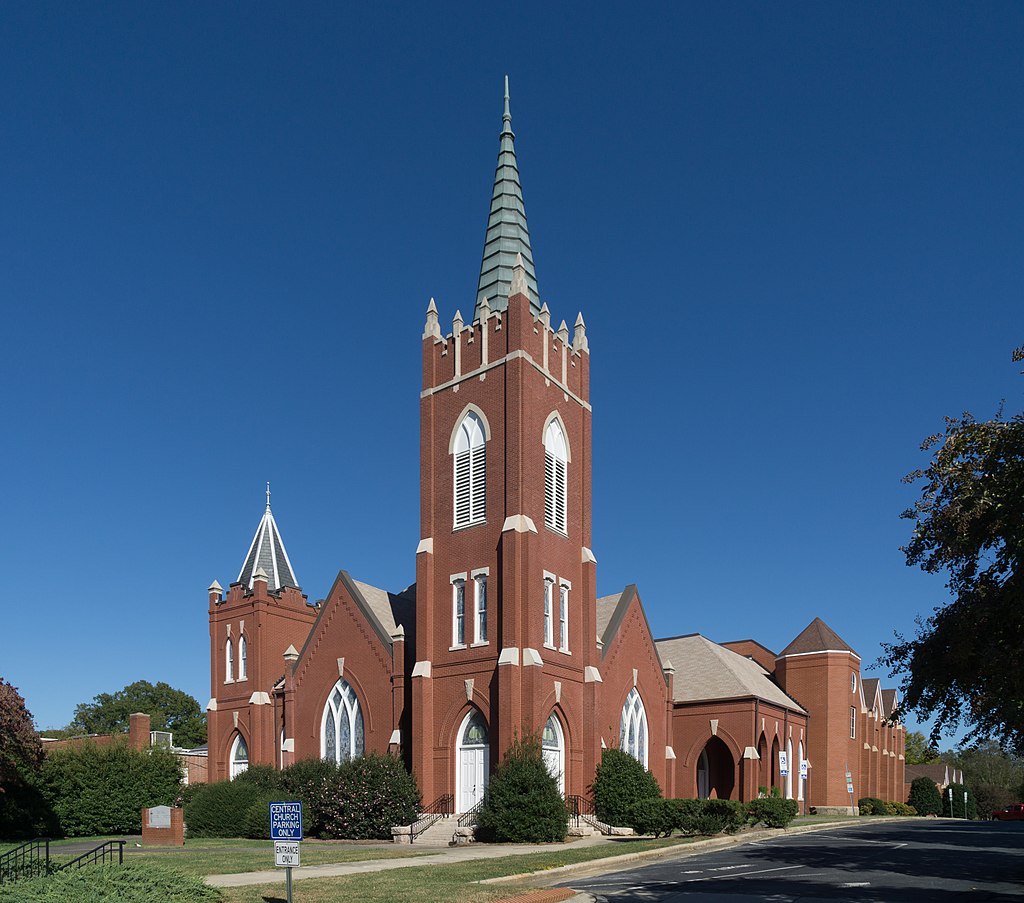
I’m not sure that the average Australian has any interest in being called or not called evangelical. What’s more the people in churches I’ve spoken to seem to believe it’s a term saying whether they share their faith with others (aka if they evangelise) which is a misunderstanding of the word.
All of this to say I think Australia needs a completely different method of measuring beliefs than what could be true for North America.
Several Christian movements in Australia are pretty keen on being called “evangelical”. For example, Sydney Anglicans, FIEC – a church planting movement with evangelical in its name, the Fellowship of Independent Evangelical Churches. But you are indeed correct to say the average Australian is not interested in being called evangelical. In the US, there are categories of church that make sense there but are not so relevant here. The “mainline churches” are the liberal/progressive churches (including the larger Episcopal, Lutheran, and Presbyterian groups, with the United Methodists losing their evangelical wing to belong in that category.) But in Australia, that space is mostly taken up by one church, the Uniting church, with a few Anglican dioceses. And the evangelical parts of the Australian churches are broader politically than the white evangelicals of the US. You are right. We need different categories, which I suspect is a good thing.